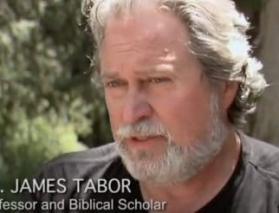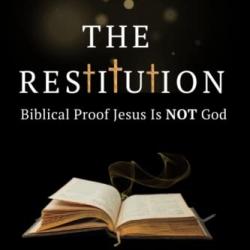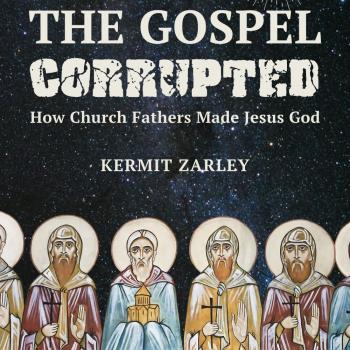One of the primary biblical passages Christians cite to support their belief that Jesus is God is Isaiah 9.6. It reads in the NASB, “For a child will be born to us, a son will be given to us; and the government will rest on His shoulders; and His name will be called Wonderful Counselor, Mighty God, Eternal Father, Prince of Peace.”
Hymns have always played a significant role in Christian worship. The translation “Mighty God” in Isaiah 9.6 has inspired many church hymns about Jesus. The one most memorable to Westerners is the final, heart-stirring ensemble in Handel’s magnificent Messiah. It is often performed by church choirs at Christmastime. But hymnology is no substitute for sound theology. When hymns reflect Christian theology, they should do so accurately and therefore scripturally.
Both Jews and Christians have always correctly interpreted Isaiah 9.1-7 as messianic. Christians have rightly applied all of the epithets in the second half of v. 6 to Jesus. The epithet translated “Mighty God” is el gibbor in the Hebrew text. But is “Mighty God” the correct translation of el gibbor here, so that it calls Jesus “God”?
El is the primitive Semitic root for “god/God.” It occurs 230 times in the Masoretic Text (MT) of the Old Testament (OT). Sometimes, it identifies men. Many OT characters bore the word el in their names, such as Israel (Heb. Yisrael). Of course, it only signifies belonging to God, not such men are God. Calling Messiah el gibbor is similar to calling him “Immanuel” in Isaiah 7.14. Therein, el is not intended to identify the Messiah as God, but “God with us” (Matthew 1.23). That is, since God is with his Messiah, God thereby is with his people.
The Hebrew word gibbor occurs over 150 times in the MT in either its singular gibbor or its plural form gibborim. In over half of these instances the New American Standard Bible renders gibbor(im) “mighty” or “mighty man” or “mighty men.” In thirty-eight of them it is translated “warrior(s).” This evidence shows that el gibbor can be treated as an adjective or a substantive (noun) which designates men. Context and associated words are the main determining factors in how to translate it.
Gibbor or gibborim in the MT often refers to a military figure since it means “strong, vigorous, hero, champion.” For example, we read of David’s “mighty men” (gibborim), referring to his soldiers (2 Samuel 23.8). (Similarly, see 2 Samuel 1.21; 2 Kings 24.16.)
The Greek Old Testament (Septuagint=LXX; third century BCE) translates el gibbor in Isaiah 9.6 as megales boules angelos. We get our English word “angel” from angelos. But angelos often has the wider meaning of “messenger.” So, this expression in the LXX is usually translated “messenger of mighty counsel,” not “Mighty God.” This is significant because these pre-Christian, Jewish translators could not have been biased against the later, Christian interpretation, that is, that el gibbor identifies Jesus of Nazareth as “God.”
Jews and Christians have disagreed on the construction, and therefore the application, of these epithets in Isaiah 9.6. While the Targum on Isaiah and later rabbinical commentators, such as Rashi and Kimchi, interpret the “child” as Messiah, they also interpret el gibbor as referring to God and not the Messiah, thereby avoiding calling Messiah “God.” Either they have applied only el gibbor to God and the other titles to Messiah or they have rendered all of these epithets to God except “Prince of Peace.” Ibn Ezra avoided interpreting the “child” as Messiah by applying all the titles to King Hezekiah or his son.
Christian scholars have contended that both of these constructions are forced, thus charging these rabbis with bias. And since Matthew quotes Isaiah 9.1-2 and refers it to Jesus (Matthew 4.14-16; cf. Luke 1.79), many Christian scholars have insisted its closeness to v. 6 suggests that all of those epithets should be applied to the Messiah.
Some distinguished Christian scholars have not translated el gibbor in Isaiah 9.6 as “Mighty God.” Martin Luther, in his German Bible translation, renders it “Kraft-held,” which means “Strength-Hero.” He explains that this epithet “belongs not to the person of Christ, but to his work and office.” Formerly preeminent Roman Catholic NT scholar Raymond E. Brown insisted that Isaiah did intend to call Messiah “god/God,” here, but only as a king of Israel in a royal psalm, e.g., in Psalm 45.6. Some English Bibles render it “Godlike hero” or “God-Hero,” e.g., mighty warrior.
Indeed, the immediately prior context of Isaiah 9.6 presents Messiah as a Galilean warrior. It reads, “But there will be no more gloom for her who was in anguish;… Galilee of the Gentiles. The people who walk in darkness will see a great light; those who live in a dark land, the light will shine on them. You shall multiply the nation, you shall increase their gladness; they will be glad in Your presence as with the gladness of harvest, as men rejoice when they divide the spoil [of war]. For You shall break the yoke of their burden and the staff on their shoulders, the rod of their oppressor, as at the battle of Midian. For every boot of the booted warrior in the battle tumult, and cloak rolled in blood, will be for burning, fuel for the fire” (Isaiah 9.1-6). Christians have always applied it to their Lord Jesus being from Galilee and saying, “I am the light of the world” (John 8.12; 9.5). The Apostle Paul interprets this warrior as Messiah Jesus destroying the “lawless one,” who is the final Antichrist (2 Thessalonians 2.8).
Besides Isaiah 9.6, the expression el gibbor occurs only one other time in the MT, in Isa 10.21. This verse predicts that on the eschatological Day, which Christians call “the second coming of Christ,” a repentant remnant of Israeli Jews will survive an attack and return to God to forever rely upon him. It is presumed that el gibbor refers to God, here, being translated “the mighty God” in most English versions. For this reason, plus its close proximity to Isaiah 9.6, many Christian scholars regard el gibbor in Isaiah 10.21 as certain evidence that el gibbor in Isaiah 9.6 should be rendered likewise.
However, Isaiah 10.20-21 undoubtedly will be accomplished by means of messianic agency, as in Isaiah 9.3-7. That is, the surviving Jewish remnant will return to God on the eschatological Day by literally presenting itself in servitude before Messiah its King, whom God will send to be its Deliverer. For, immediately following Isaiah 9.6 the prophet says concerning the military success and governmental reign of Messiah that “the zeal of the LORD of hosts will accomplish this” (v. 7), that is, by means of the Messiah. So, el gibbor in both Isaiah 9.6 and 10.21 may refer to the Messiah.
Regardless, it ought to be concluded that interpreting el gibbor in Isaiah 9.6 as “mighty warrior” fits the context better and thus does not call Jesus “Mighty God.”
…………….
To see a list of titles of 130+ posts (2-3 pages) that are about Jesus not being God in the Bible, with a few about God not being a Trinity, at Kermit Zarley Blog click “Chistology” in the header bar. Most are condensations of my book, The Restitution of Jesus Christ. See my website servetustheevangelical.com, which is all about this book, with reviews, etc. Learn about my books and purchase them at kermitzarley.com. I was a Trinitarian for 22 years before reading myself out of it in the Bible.
















